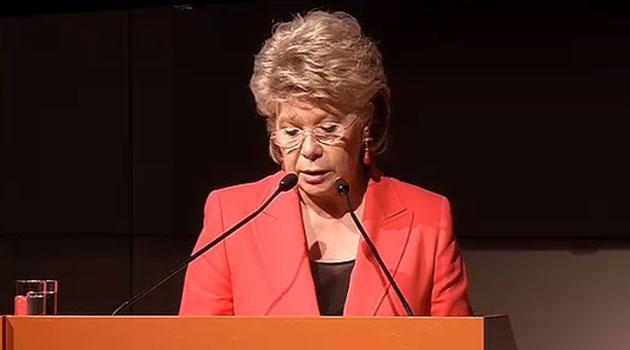I remember very well: 8 April 2010, in Córdoba, Spain. A Ministerial meeting
on Roma – without Ministers. Exactly four years later, I stand here with the
President of the European Commission, the President of Romania (Traian Băsescu),
the Deputy Prime Minister of Bulgaria (Zinaida Zlatanova) and Ministers, mayors
and State secretaries from many other EU and non-EU countries.
From Córdoba to Brussels: a wind of change is blowing. Roma integration is on
the radar screen of politicians.
And it is not only on the radar screen. Ministers have made commitments. And
these commitments are slowly but surely translated into actions.
What started maybe as a wake-up call in France in the summer of 2010, has
become an irreversible process: Thanks to the EU Framework for national Roma
integration strategies that the Commission put on the table in April 2011, every
Member State now has a national Roma action plan. Thanks to the EU Framework
every Member State now has a national Roma contact point to coordinate work
between the different actors and make sure the national strategy remains more
than just a paper. These national contact points also get together in Brussels
regularly to exchange experiences and discuss what works and what doesn’t.
And then we – the European Commission – analyse progress, every year, and
report to Parliament and Council on the progress made in the 28 Member States on
Roma integration.
The Commission is in the driving seat. But we can only drive if there is an "engine".
And there is – 28 actually: last December, national ministers unanimously
committed to implementing key recommendations put forth by the European
Commission to further Roma integration in the four main areas of education,
employment, healthcare and housing. And to use when necessary positive actions
to close the gap between the Roma and the rest of the population.
While, a lot of work remains to turn recommendations into reality, progress
is visible.
We see many small miracles – Europe-wide. Concrete actions and projects on
the ground, in the 28 Member States that can improve the life of Roma people.
Let me give you a few examples.
Starting with education: Although the situation differs between EU countries,
studies show that on average only around 40% of Roma children complete primary
school – compared to an average of 97% for the general population across the EU.
That is why the Commission’s Framework called on all Member States to make sure
all Roma children complete at least primary school. To break the vicious circle
of Roma who have no education and who later cannot find a job and therefore end
up living in sheer poverty; to ensure Roma children get education today, to find
work tomorrow.
Progress on this front has been good. In Finland for example, over the past
years, the participation of Roma children in pre-primary school increased from
2% to 60%. Or take Hungary: it passed a new law making 2 years of pre-school
compulsory and the enrolment rate of Roma children in pre-school is now as high
as 79%. Also Bulgaria passed a law to make pre-schooling compulsory. And in
Ireland there are "travelling teachers" moving with Travellers’ communities.
One of the main challenges that remains in the area of education is
segregation. Yes, Roma children do sometimes require specific care and attention
but sending them to schools for people with disabilities is not a solution which
will help their integration. Instead, what seems to work very well, and what we
are seeing more and more across Europe, is the use of mediators.
In the area of employment for example, EU-funded Roma employment mediators
exist in Finland, the ‘UusiTaito’; and in Spain the Acceder programme uses work
counsellors to advise Roma in their job searches.
In the area of health, Romania and Spain employ mediators to improve access
to healthcare of the Roma community, while France cut the registration tax for
State Medical aid therefore removing financial barriers for Roma.
Or in the area of housing, where in Belgium, for example, there are around 38
mediators working to gain the trust of both Roma and non-Roma for acceptable
housing interventions. Other positive efforts in the area of housing include
Hungary where cities are required to prepare a desegregation plan as part of
city development strategies; and Croatia and Slovenia, where the legalisation of
Roma settlements is a condition for the construction of basic infrastructure.
All of these examples are small steps. But taken together and rolled out
Europe-wide, they can lead to a great leap forward in the integration of Roma.
It’s about learning from each other by copying successful projects. But it is
also learning by doing. What I have certainly learned – as a former City
Counsellor but also during my many talks with mayors from Europe – is that
unfortunately the money that is available for integration is either not known of;
or it simply does not arrive where it is needed. I also know that with Roma
integration politicians unfortunately do not win elections.
As a next step, I could therefore imagine more targeted rules and a funding
facility specifically dedicated to Roma – a centralised EU fund that would be
reserved for concrete projects benefitting Roma. This is an area where the
Commission can go further in our commitment. In turn, we will however expect
Member States to make sure Roma strategies do not remain on paper only.
Roma integration is a common challenge. Roma people are Europeans. Member
States, politicians and European institutions have a joint responsibility to put
an end to Roma exclusion – from schools, jobs, healthcare and housing.
Tackling this challenge, will take time. You may not see the results when you
visit Roma camps where people still live in poverty, but results – all these
small miracles – are there. This is the first EU Roma Summit which gives me
reason for hope.
